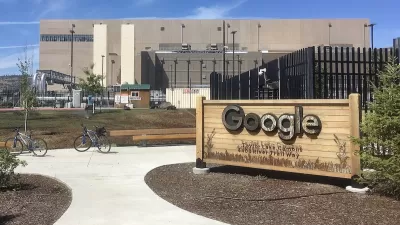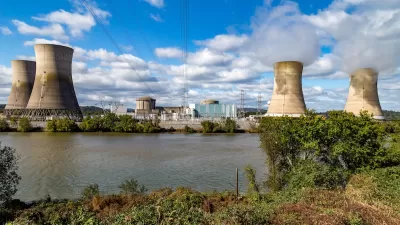A watchdog group is questioning whether the benefits of data centers outweigh their negative impacts on the local economy and power grid.

Watchdog group Policy Matters Ohio is raising some key concerns about the proliferation of data centers in the state, including “whether the state is giving up too much in tax revenue for the number of jobs they’ll create, who will pay to add electricity generation to meet the centers’ surging demand, and whether the new demand will force fossil-fuel burning generators to stay online, making the world’s climate crisis worse.”
As Marty Schladen explains in the Ohio Capital Journal, the group says the state’s tax exemptions subsidize some of the world’s largest corporations at the expense of its residents. “The investments the companies are making might sound huge, but exemptions already granted to Google and Facebook owner Meta cost Ohio an estimated $1 million per job created, the analysis said.” Even so, research shows that tax incentives are only the deciding factor in a small number of decisions about data center locations.
Data centers require massive amounts of electricity, raising questions about the state’s capacity to support them while maintaining a reliable supply for other needs.
FULL STORY: Serious concerns raised over proliferation of Ohio data centers

Alabama: Trump Terminates Settlements for Black Communities Harmed By Raw Sewage
Trump deemed the landmark civil rights agreement “illegal DEI and environmental justice policy.”

Planetizen Federal Action Tracker
A weekly monitor of how Trump’s orders and actions are impacting planners and planning in America.

The 120 Year Old Tiny Home Villages That Sheltered San Francisco’s Earthquake Refugees
More than a century ago, San Francisco mobilized to house thousands of residents displaced by the 1906 earthquake. Could their strategy offer a model for the present?

LA’s Tree Emergency Goes Beyond Vandalism
After a vandal destroyed dozens of downtown LA trees, Mayor Karen Bass vowed to replace them. Days later, she slashed the city’s tree budget.

Sacramento Leads Nation With Bus-Mounted Bike Lane Enforcement Cameras
The city is the first to use its bus-mounted traffic enforcement system to cite drivers who park or drive in bike lanes.

Seattle Voters Approve Social Housing Referendum
Voters approved a corporate tax to fund the city’s housing authority despite an opposition campaign funded by Amazon and Microsoft.
Urban Design for Planners 1: Software Tools
This six-course series explores essential urban design concepts using open source software and equips planners with the tools they need to participate fully in the urban design process.
Planning for Universal Design
Learn the tools for implementing Universal Design in planning regulations.
Ada County Highway District
Clanton & Associates, Inc.
Jessamine County Fiscal Court
Institute for Housing and Urban Development Studies (IHS)
City of Grandview
Harvard GSD Executive Education
Toledo-Lucas County Plan Commissions
Salt Lake City
NYU Wagner Graduate School of Public Service





























